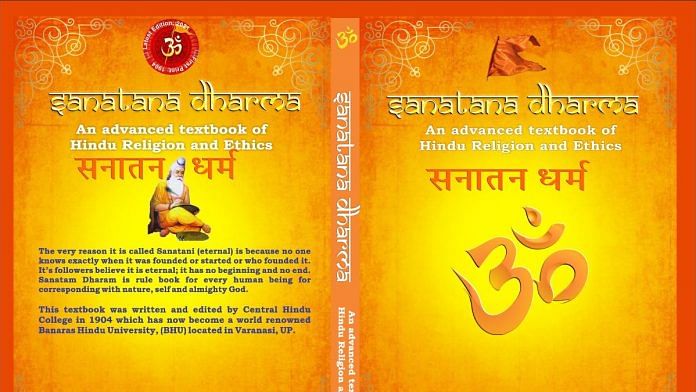Thank you dear subscribers, we are overwhelmed with your response.
Your Turn is a unique section from ThePrint featuring points of view from its subscribers. If you are a subscriber, have a point of view, please send it to us. If not, do subscribe here: https://theprint.in/subscribe/
In a world marked by diversity, conflict, and ever-evolving belief systems, the call for unity and harmony among humanity often takes center stage. Transcending religious boundaries and embracing fundamental values like harmony, peace, love, sharing, caring, and learning should be our primary focus. Sanatana Dharma, offers a unique perspective on these values, presenting them as universal principles applicable to all forms of life in nature, everywhere, and at all times.
Santana – Beyond Religion
Sanatana Dharma, which can be translated as the “eternal path” or “eternal law,” represents a spiritual and philosophical tradition that finds its roots in the Indian subcontinent. It stands out in many ways as it transcends the conventional notion of religion. Instead, it emphasizes a set of core values and principles that can be applied universally, regardless of one’s religious or cultural background.
This verse from Rigveda(1.89.1), “Let noble thoughts come to us from all sides.”, emphasizes the importance of open-mindedness and receptivity to wisdom and noble thoughts from all directions, regardless of one’s background.
At the heart of Sanatana Dharma lies the principle of harmony. This ancient wisdom teaches us to seek equilibrium within ourselves, with others, and with the natural world. This concept of balance extends to every aspect of life, from personal relationships to environmental stewardship.
The Bhagavad Gita verse 2.47 encourages selfless action and detachment from the outcomes, promoting a sense of duty without attachment to the results.
“The whole world is one family”, says Chandogya Upanishad 6.4.7. This teaching emphasizes the concept of Vasudhaiva Kutumbakam, recognizing the interconnectedness of all beings and promoting a sense of universal kinship.
Love and compassion are central values in Sanatana Dharma. The belief in the divine presence within all beings fosters a sense of interconnectedness, urging us to treat all with kindness and empathy.
Sanatana Dharma promotes the idea of sharing resources and caring for the less fortunate. The concept of “dharma” includes the duty to support and uplift those in need. Continuous learning and the pursuit of wisdom are encouraged. Sanatana Dharma recognizes that knowledge is a tool for personal and societal growth.
Sanatana Dharma in Practice
The practical application of Sanatana Dharma is not limited to rituals or ceremonies but extends to daily life. It invites individuals to live in alignment with these universal values, creating a ripple effect of positive change in society.
It inspires sustainable living and responsible stewardship of the planet. For instance, Sanatana Dharma emphasizes the sacredness of nature and our responsibility to protect it. This eco-conscious approach is increasingly relevant in today’s world facing ecological challenges.
Sanatana Dharma promotes interfaith harmony and cooperation, by transcending religious boundaries and focusing on shared values,
Sanatana Dharma places great importance on self-realization and inner fulfillment. Through practices like meditation and mindfulness, it encourages individuals to find serenity within themselves, contributing to a more peaceful world. The idea is that by understanding oneself deeply, individuals can discover their purpose and meaning in life. This encourages individuals to develop qualities that benefit not only themselves but also those around them.
Respect for All Living Beings
At the core of Sanatana Dharma is the principle of Ahimsa, or non-violence. This extends not only to human beings but to all living creatures. This reverence for life and the environment is not merely an ancient belief but a relevant and urgent call for environmental conservation and the well-being of all species in today’s world.
Universal Ethics
Sanatana Dharma’s ethical framework extends beyond religious boundaries. It presents a set of universal ethical principles that resonate with people of diverse faiths and beliefs. These principles include truthfulness, integrity, gratitude, and humility, which can serve as a common moral foundation for humanity.
While Sanatana Dharma has its roots in India, it does not seek to impose a single culture or belief system. Instead, it celebrates cultural diversity and encourages individuals to find their unique spiritual path within the broader framework of universal values.
A Call for Global Unity:
As we confront global challenges, a divisive world and social inequalities, Sanatana Dharma’s teachings of unity and the oneness of all life are more relevant than ever. By embracing these values, we can work collectively to create a more just, equitable, and harmonious world.
Sanatana Dharma offers a timeless and profound philosophy that transcends religious and cultural boundaries. Its universal values of harmony, peace, love, sharing, caring, and learning provide a moral and ethical compass to navigate the complexities of the modern world. By embracing these principles and applying them in our lives, we can contribute to a more compassionate, inclusive, and sustainable future for all of humanity.
(Mohan Murti is Advocate & former Europe Director of Reliance Industries Limited)
These pieces are being published as they have been received – they have not been edited/fact-checked by ThePrint.

